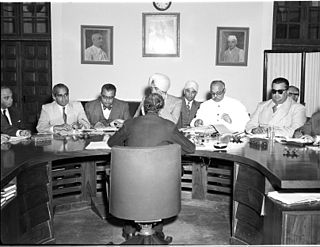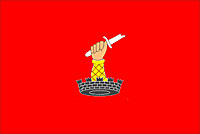| |||||
| Centuries: | |||||
|---|---|---|---|---|---|
| Decades: | |||||
| See also: | List of years in India Timeline of Indian history | ||||
Events in the year 1851 in India.
| |||||
| Centuries: | |||||
|---|---|---|---|---|---|
| Decades: | |||||
| See also: | List of years in India Timeline of Indian history | ||||
Events in the year 1851 in India.

The Most Exalted Order of the Star of India is an order of chivalry founded by Queen Victoria in 1861. The Order includes members of three classes:

The Rajputana Agency was a political office of the British Indian Empire dealing with a collection of native states in Rajputana, under the political charge of an Agent reporting directly to the Governor-General of India and residing at Mount Abu in the Aravalli Range. The total area of the states falling within the Rajputana Agency was 127,541 square miles (330,330 km2), with eighteen states and two estates or chiefships.

Balaji Baji Rao, often referred to as Nana Saheb I, was the 8th Peshwa of the Maratha Confederacy. He was appointed as Peshwa in 1740 upon the death of his father, the Peshwa Bajirao I.

Rajpramukh was an administrative title in India which existed from India's independence in 1947 until 1956. Rajpramukhs were the appointed governors of certain Indian provinces and states.
The three Round Table Conferences of 1930–1932 were a series of peace conferences organized by the British Government and Indian political personalities to discuss constitutional reforms in India. These started in November 1930 and ended in December 1932. They were conducted as per the recommendation of Muhammad Ali Jinnah to Viceroy Lord Irwin and Prime Minister Ramsay MacDonald, and by the report submitted by the Simon Commission in May 1930. Demands for Swaraj or self-rule in India had been growing increasingly strong. B. R. Ambedkar, Jinnah, Sir Tej Bahadur Sapru, V. S. Srinivasa Sastri, Sir Muhammad Zafrulla Khan, K. T. Paul and Mirabehn were key participants from India. By the 1930s, many British politicians believed that India needed to move towards dominion status. However, there were significant disagreements between the Indian and the British political parties that the Conferences would not resolve. The key topic was about constitution and India which was mainly discussed in that conference. There were three Round Table Conferences from 1930 to 1932.

The history of human settlement in the west Indian state of Rajasthan dates back to about 5,000 years ago. Around 1400 BC, the Matsya tribe occupied the region. Parts of Rajsthan also belonged to the site of the Indus Valley Civilization. The early medieval period saw the rise of many Rajput kingdoms such as the Chauhans of Ajmer, Sisodias of Mewar, Gurjara-Pratihara and the Rathores of Marwar, as well as several Rajput clans such as the Gohil and the Shekhawats of Shekhawati. While Jat kingdoms include the Johiya of Jangaldesh, the Sinsinwars of Bharatpur State, as well as the Bamraulia clan and the Ranas of Dholpur.

Sangli State was one of the 11-gun salute Maratha princely states of British India. It was under the Kolhapur-Deccan Residency in the Bombay Presidency, and later the Deccan States Agency.

Bikaner State was a princely state in the Rajputana from 1465 to 1947. The founder of the state, Rao Bika, was the eldest son of Rao Jodha, ruler of Jodhpur. Rao Bika chose to build his own kingdom instead of inheriting his father's. Bika defeated the Jat clans of Jangladesh along with his uncle Rao Kandhal and his adviser Vikramji Rajpurohit and founded his own kingdom. Its capital was the city of Bikaner in the northern area of present-day Rajasthan State in India. Karni Mata has been designated as the kuldevi of the Royal family of Bikaner.
Events in the year 1707 in India.

The Chhota Udaipur State or 'Princely State of Chhota Udaipur', was a princely state with its capital in Chhota Udaipur during the era of British India. The last ruler of Chhota Udaipur State signed the accession to join the Indian Union in 1948. Chhota Udaipur shares a history with Devgadh Baria and Rajpipla as one of the three princely states of eastern Gujarat.
This article details events in the year 1840 in India. Occurrences include the establishment of the Bank of Bombay, and the fall of the Maqpon dynasty.
This article details events occurring in the year 1839 in India. Major events include the reduction of the Khanate of Kalat to a subsidiary ally of the British, and the capture of Aden in Yemen by the East India Company, creating an important stopover for voyages between Europe and India.
This list details events in the year 1838 in India. Major events include the Agra famine of 1837-38, and the founding of the Times of India on 3 November.
Events in the year 1867 in India.
Events in the year 1866 in India.
The 1866 Birthday Honours were appointments by Queen Victoria to various orders and honours to reward and highlight good works by citizens of the British Empire. The appointments were made to celebrate the official birthday of the Queen, and were published in The London Gazette on 25 May and 29 May 1866.
{{cite web}}: CS1 maint: unfit URL (link)